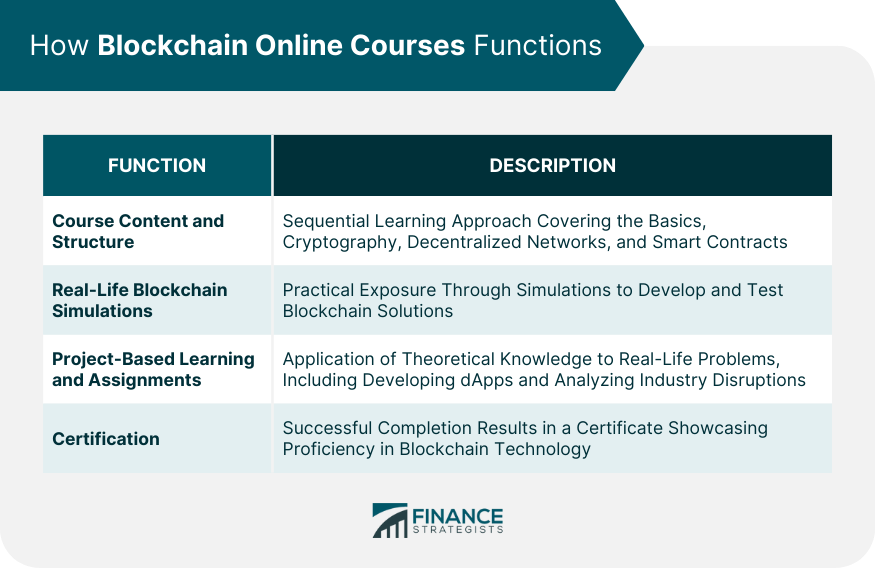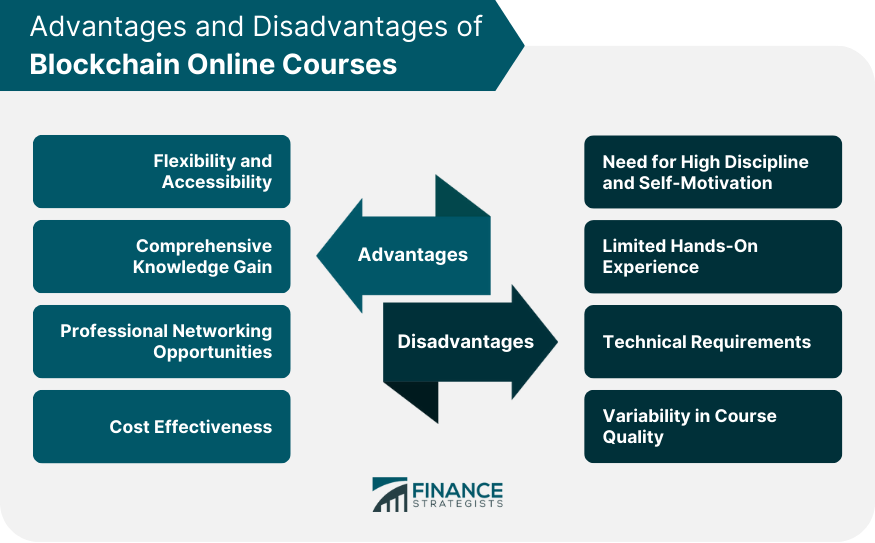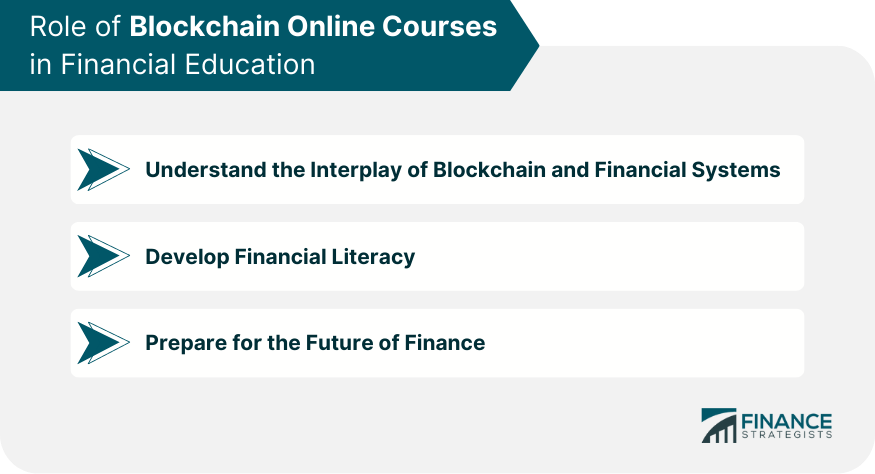Blockchain online courses are dynamic educational programs designed to meet the learning needs of blockchain technology and cryptocurrency enthusiasts. These courses offer a diverse curriculum, covering essential topics ranging from the fundamentals of blockchain and cryptography to decentralized networks and the development of smart contracts. By demystifying the intricate world of blockchain technology, these courses foster a deeper understanding that goes beyond the surface level. In today's era of digital transformation and relentless innovation, blockchain technology has emerged as a game-changer. Its potential impact extends far beyond the realm of cryptocurrencies, influencing sectors such as healthcare, supply chain management, and finance. Online courses play a crucial role by equipping individuals with the knowledge and skills required to navigate and drive innovation within the blockchain ecosystem. Online courses on blockchain often provide a sequential approach to learning. They begin with simple introductory lessons explaining the concept and history of blockchain technology before delving into more complicated subjects like its operational mechanism, the role of cryptography in securing blockchain transactions, and the nature of smart contracts. Following this, the courses may focus on the practical applications of blockchain across multiple sectors. A prominent feature of many blockchain online courses is the inclusion of real-life simulations. These simulations provide practical exposure, enabling learners to develop and test blockchain solutions in a risk-free environment. Students may find themselves creating mini blockchains, initiating transactions, or developing smart contracts on platforms like the Ethereum network. Project-based learning and assignments are integral parts of blockchain online courses. Students get the opportunity to apply the theoretical knowledge acquired from the course to solve real-life problems. These projects may range from developing decentralized applications (dApps) and devising blockchain strategies for businesses to analyzing how blockchain technology can disrupt specific industries. On successful completion, students receive a certificate from the course provider. This certificate often serves as a testament to the individual's proficiency in blockchain technology, enhancing their employability and making them stand out in a competitive job market. One of the most noteworthy advantages of online courses is the flexibility they offer. As the content is accessible online, individuals can learn at their own pace, regardless of their geographical location. This feature proves to be particularly beneficial for working professionals or those who find it difficult to adhere to a strict learning schedule. Blockchain online courses are designed to offer a comprehensive understanding of the subject. They delve into both theoretical aspects and practical applications of blockchain technology, preparing learners for a variety of roles within the industry. Several online courses also facilitate networking among learners, instructors, and industry professionals. These connections can provide invaluable opportunities for collaboration, knowledge sharing, job prospects, and more. Online courses are often more affordable compared to their traditional counterparts. The lower price point broadens access to blockchain education, fostering a larger, diverse group of skilled professionals within the field. Online courses, being predominantly self-paced, require learners to exercise high levels of discipline and motivation. Without a structured classroom environment and regular class schedules, some students may struggle with procrastination or a lack of commitment, which can impact their learning outcomes and course completion. While online courses often try to incorporate practical exercises, there's a limit to the hands-on experience they can provide compared to traditional classroom learning. This is a challenge that both course providers and students need to acknowledge and address. To participate in blockchain online courses, students typically need a stable internet connection and a computer capable of running the necessary software. This requirement might pose a challenge for individuals with limited resources. The quality of blockchain online courses can vary significantly. Not all courses are created equal, and prospective students need to conduct thorough research to ensure the course they choose offers high-quality, relevant content and is delivered by qualified instructors. Before committing to a course, prospective students should carefully review the syllabus to ensure it aligns with their learning objectives. The best courses offer a balanced mix of theory and practical application and facilitate hands-on learning through projects and simulations. It's also crucial to consider the credentials of the course provider. Trusted educational institutions or providers with a track record of delivering high-quality blockchain education are generally more reliable. Feedback from previous students can offer valuable insights into a course’s quality. Reviews can provide information on the effectiveness of the teaching methods, the relevance of the content, and the overall learning experience. While online courses are generally more affordable than traditional education, the cost can still be a factor to consider. It is important to weigh the cost of the course against the value it provides in terms of knowledge acquisition, career progression opportunities, and the reputation of the certification. With the rise of blockchain technology, there is a growing demand for professionals skilled in this field. Completing a blockchain online course can significantly improve job prospects, as it indicates the individual's competence and dedication to employers. For professionals already working in the field, blockchain online courses provide an opportunity to upskill and stay updated with the latest advancements. This continual learning can lead to career advancement and enhanced job security. Understanding blockchain can be a significant advantage for entrepreneurs in the tech or finance sectors. Online courses can equip them with the necessary knowledge to leverage blockchain technology, leading to the creation of innovative products and services. Blockchain has the potential to revolutionize traditional financial systems by enhancing transparency, security, and efficiency. Blockchain online courses play a crucial role in educating individuals about this transformation, enabling them to better navigate the changing financial landscape. Learning about blockchain also contributes to financial literacy. By understanding the dynamics of blockchain and cryptocurrencies, individuals can make informed decisions about digital assets. As the finance sector increasingly incorporates blockchain technology, professionals with a sound understanding of blockchain will be in a strong position to influence and navigate this new world of finance. Blockchain online courses offer a dynamic and flexible way to acquire comprehensive knowledge in blockchain technology and cryptocurrencies. These courses demystify the intricacies of blockchain, providing learners with a deeper understanding beyond the basics. In today's rapidly transforming digital landscape, blockchain technology has emerged as a game-changer with far-reaching implications in sectors like healthcare, supply chain management, and finance. The advantages of online courses include flexibility, accessibility, comprehensive knowledge gain, and networking opportunities. However, challenges such as self-discipline, limited hands-on experience, technical requirements, and variability in course quality exist. Choosing the right course involves assessing content, checking credentials, and reading reviews. The impact of blockchain online courses extends to enhancing job opportunities, upskilling professionals, fostering entrepreneurial ventures, and contributing to financial education. Understanding the interplay between blockchain and financial systems, developing financial literacy, and preparing for the future of finance are key roles of these courses.Definition of Blockchain Online Courses
How Blockchain Online Courses Function
Course Content and Structure
Real-Life Blockchain Simulations
Project-Based Learning and Assignments
Certification

Advantages of Blockchain Online Courses
Flexibility and Accessibility
Comprehensive Knowledge Gain
Professional Networking Opportunities
Cost Effectiveness
Potential Challenges With Blockchain Online Courses
Need for High Discipline and Self-Motivation
Limited Hands-On Experience
Technical Requirements
Variability in Course Quality

Choosing the Right Blockchain Online Course
Assess Course Content and Structure
Check the Credentials of the Course Provider
Read Reviews and Feedback
Compare Cost vs Value
Impact of Blockchain Online Courses on Career Prospects
Enhance Job Opportunities in Blockchain and Crypto Industries
Upskill for Current Professionals
Entrepreneurial Ventures
Role of Blockchain Online Courses in Financial Education
Understand the Interplay of Blockchain and Financial Systems
Develop Financial Literacy
Prepare for the Future of Finance

Conclusion
Blockchain Online Courses FAQs
Blockchain online courses are digital educational programs that cover various topics related to blockchain technology and cryptocurrencies. These courses provide structured learning and promote a comprehensive understanding of the subject.
Blockchain online courses typically follow a sequential approach, starting with introductory lessons on blockchain basics and progressing to more complex topics such as cryptography, decentralized networks, and smart contracts. They may also include real-life simulations and project-based learning to enhance practical skills.
Blockchain online courses offer flexibility and accessibility, allowing learners to study at their own pace. They provide comprehensive knowledge, covering theoretical concepts and practical applications. Additionally, these courses facilitate professional networking opportunities and are often more cost-effective compared to traditional education.
While blockchain online courses offer many benefits, they require high levels of discipline and self-motivation as they are predominantly self-paced. Additionally, hands-on experience may be limited compared to traditional classroom learning. Technical requirements, such as a stable internet connection and compatible devices, can also be a challenge for some individuals. Furthermore, the quality of courses can vary, necessitating thorough research before enrollment.
To choose the right blockchain online course, consider factors such as course content and structure, ensuring it aligns with your learning objectives. Check the credentials of the course provider, read reviews and feedback from previous students, and compare the cost versus the value offered by the course. Taking these steps will help you make an informed decision and select a high-quality course that meets your needs.
True Tamplin is a published author, public speaker, CEO of UpDigital, and founder of Finance Strategists.
True is a Certified Educator in Personal Finance (CEPF®), author of The Handy Financial Ratios Guide, a member of the Society for Advancing Business Editing and Writing, contributes to his financial education site, Finance Strategists, and has spoken to various financial communities such as the CFA Institute, as well as university students like his Alma mater, Biola University, where he received a bachelor of science in business and data analytics.
To learn more about True, visit his personal website or view his author profiles on Amazon, Nasdaq and Forbes.











